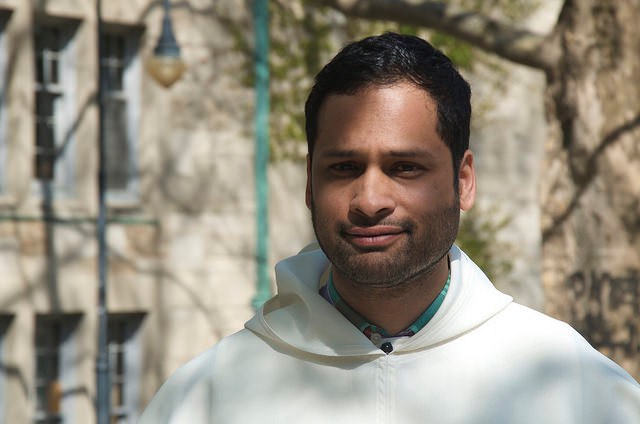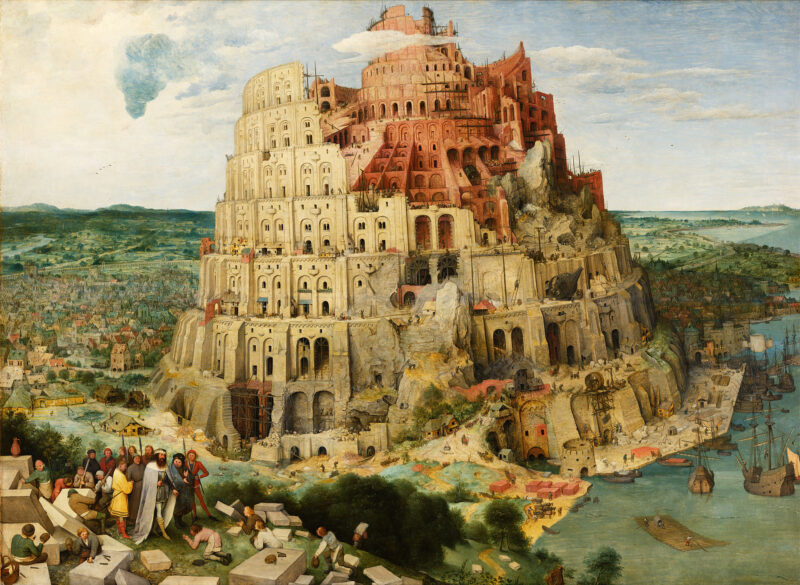Throughout the seasons of Lent and Easter, Dr. Darren Dias, OP, who teaches systematics at the Faculty of Theology, has shared his homilies with the broader university community. For the Feast of Pentecost, he spoke on the subject of race and renewal.
Pentecost 2020: Act 2:1-11; 1 Cor 12:3-7, 12-13; John 20:19-23
Today we celebrate the renewal of creation when the risen Lord appears amidst his disciples and breathes life into them, as God first breathed life into Adam (Genesis 2:7). But today the last words of George Floyd—a 46 year-old father of 2 brutally murdered by police because he was black—echo in our midst: “I can’t breathe.”
This week the Ontario government warned that confinement and distancing regulations will not be relaxed as expected because of the increase of COVID-19 cases. We see these especially in lower income and new immigrant areas of the city where pockets of racialized persons live. We have spent the entire Easter Season in confinement and now at its completion, it looks like it will be prolonged.
Perhaps not unlike the disciples we lock our doors out of fear of the real dangers lurking about; locked in our homes or in the bubbles created by masks and gloves and safe distance. Yet Pentecost in John’s Gospel account is the moment when Jesus appears to the disciples, meets them in their fear, and releases them from it by breathing the Spirit of new life into them, and then sending them into the world on a reconciling mission. But we remain locked up, anxious about COVID-19 , and for racialized persons like me, fearful of the lurking plague of violence. So what kind of Pentecost can we celebrate this year?
In the narrative from Acts we read another account of the giving of the Holy Spirit. A violent wind fuels the tongues of fire that appear over the disciples. These are external manifestations of the Holy Spirit’s presence in the community. Likewise, the disciples’ preaching, understood by speakers of various foreign languages, Parthians, Medes, and Elamites, Libyans, Romans, Cretans, etc., is a manifestation of the Spirit’s power.
Pentecost is often seen as a remedy to the confusion of the multiple languages that resulted from the destruction of the tower of Babel in Genesis 11. Now we don’t have readings from the Hebrew Bible during the Easter season, but if you remember in Genesis 11 the whole earth is said to have spoken one language. This makes the people of earth powerful and they decide to build a tower to the heavens as a testament to their power. In response the Lord comes and scatters the people, replacing the single language that seemed to be constitutive of their powerful abilities with many languages. The people become confused because they are unable to understand one another due to the multiplicity of languages and their building project is left unfinished. If a multiplicity of languages that resulted in confusion was divine punishment for the Promethean building project, then Pentecost might be understood as its remedy.
For example, Gregory of Nazianzus writes:
“But as the old Confusion of tongues was laudable, when men [sic] who were of one language in wickedness and impiety, even as some now venture to be, were building the Tower; (Genesis 11:7) for by the confusion of their language the unity of their intention was broken up, and their undertaking destroyed; so much more worthy of praise is the present miraculous one. For being poured from One Spirit upon many men, it brings them again into harmony.” (St. Gregory of Nazianzen, Oration 41)
But in the narrative from Acts 2, Pentecost does not result in a single language like Babel but is about being able to understand one another. Multiple languages are not replaced with a single language: all are speaking their own language but they understand one another.
In his reflection on Genesis 11 and Pentecost, Gustavo Gutierrez, OP, claims that the builders of Babel are punished not because of a rivalry with God and God’s ensuing jealousy, but because Babel is a “political attempt, totalitarian in nature, to dominate people.” Clear allusions to the imperial project of the tower’s construction are seen in Peter Bruegel’s painting of the Tower of Babel. Bruegel (1525-69) paints the Tower of Babel to look like one of the greatest symbols of western imperialism, the Roman Colosseum. Though a Catholic himself, Bruegel alludes to the singularity of the Latin language in the Roman Catholic Church in depicting a stylized version of one of Rome’s greatest landmarks, compared to the myriad of vernacular languages used by Protestants in the low countries of his time.
That human community is expressed through a single language is a fiction. Gutierrez argues that a single language aims at a more efficient domination of the other through “the flow of orders coming from the central authority.” Dominating and oppressive imperial projects are impeded by diversity, especially diversity in language. A single, imposed language is an abuse of language and power. Pentecost, on the other hand, is about the life giving option of diversity. This diversity of languages makes dialogue, mutual understanding, inter-personal exchange and unity possible precisely through the diversity.
The gift of the Holy Spirit did not change the immediate situation of the disciples. They still struggled with Jesus’ new mode of presence and they still feared the authorities and their message was met with resistance. But they were able to establish new ways of being community together and beyond themselves. The disciples were able to move beyond themselves to build relationships with those who were most different, strangers and foreigners.
As Pope Francis reminded us during Holy Week, the world has been sick in many ways, even before COVID-19, but many of us with privilege thought that we would not get sick. Evils like white supremacy that render human persons into things with no worth, existed before George Floyd breathed his last. But many of us imagined that we were either not susceptible to or not implicated in structures of power and race. This Pentecost we are reminded that we too can get sick and that the violence of racism looms large.
The gift of the Holy Spirit compels us to creative and bold ways to build-up human relations in their wonderful diversity. Three examples come to mind from this past week. First, this weekend the College Theological Society decided to hold its annual conference online due to COVID-19. This virtual gathering made it possible to relate to one another, to break out of our confined spaces, and to become a community of teachers and learners once again. Another example is the Atlanta Chief of Police who met with protestors in the wake of George Floyd’s murder. She did not condemn them or order them to go back home. Instead she listened to them and affirmed them in their justified fears. Protestors and police spoke peacefully and meaningfully to one another. Last, today in our zoom Eucharist we find ourselves constituting community in a new way to share in word and sacrament across special divisions. I’ve never heard so many of you say that our weekly time together has become the highlight of their week. COVID-19 reveals the depth of our need to become community.
Every Pentecost is the re-birth of the church anew into a particular time and place and context, each with its own joys and sorrows. The visible manifestation of the Holy Spirit in Pentecost today may be very similar to the first Pentecost: reaching across boundaries to understand those who live differently, speak differently, experience reality differently. Through speaking and the use of language—which is always first by listening—we exchange breath. Every language exchange includes the exchange of breath (but no ‘moist’ speaking). In these times when it has become dangerous to breathe, we are called to exchange life-giving breath as the disciples did, using language to build in inclusive community.
Our Spirit-given diversity challenges singular and dominating forms of power that dehumanize, and that ignore the breath of divine life, the Holy Spirit, who dwells in all creation, in every human being. This gift offers us countless and bold ways to build communion and inclusive community where diversity breathes life.
Gustavo Gutierrez, “Between Babel and Pentecost,” in Gustavo Gutierrez, Essential Writings ed. James B. Nickoloff (Maryknoll: Orbis Books, 1996)


